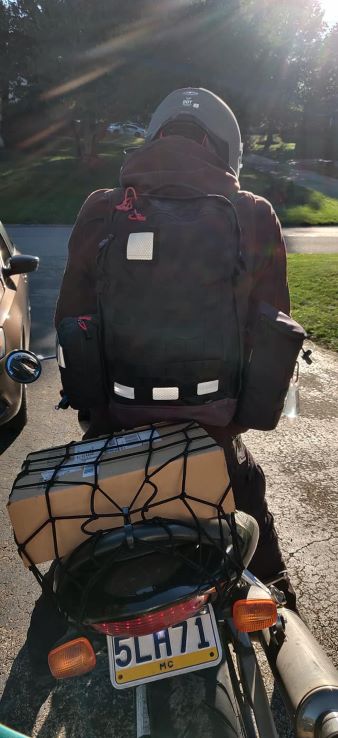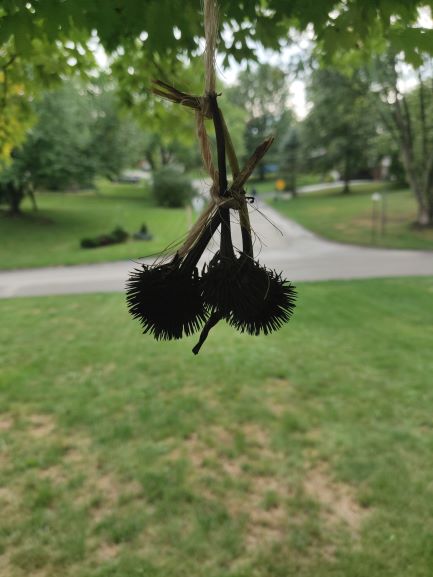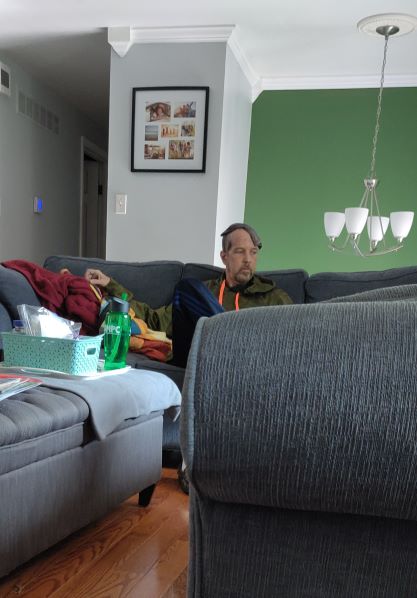One day last week, Matthew came home from school and told me he’d gotten a text that his cell phone service was suspended because our payment was late. Ugh. I grabbed my laptop to log into the account. Mark was sitting on the couch, listening. “I just paid the bill yesterday,” he said. This would be a normal statement in most households. In ours, no. Mark hasn’t paid a bill in about 14 months. And 15 months ago, the bills were paid in wacky ways. $2500 sent to the electric company, for example, which they refused to return.
“Mark, you need to talk to me about the bills if you want to start paying them. Otherwise, everything is going to get confused. How did you pay it?” “What do you mean,” he said curtly, “I paid it.” He does this a lot lately: comes back with a retort that is designed to shut down further inquiry. When he’s not sure what he has done, he tries to mask the deficit.
The account was indeed suspended. I finished paying the bill and then tried again. “Mark, I need to understand what you did.” He said he paid it on his phone. I went and got his phone. Show me. He opened up his texts. There was the text from Cricket, saying service was suspended and giving the link to pay online. In response to that text, Mark had texted back, “$100.” “So now you paid again,” he said. “No,” I said, “yours did not go through.”
Sometimes I try to explain things to him. This was not one of those times. I left Mark with Matthew and drove to the bike trail. Here’s what I thought while riding: WHY, HOW, HOW LONG. How could he think that sending a text would send money magically through the air to Cricket? How long until his brain gets better? Will it get better?
And then I checked myself. Two days prior I had asked Anya to show me how to use my new bluetooth earbuds. “First, you have to charge them,” she said. “YOU HAVE TO CHARGE BLUETOOTH EARBUDS IN ORDER TO USE THEM?!” This seemed like just a tiny bit more effort than I had signed up for. The cable to keep track of, the planning ahead, the waiting. “Did you think they just grabbed electricity out of the air ?” she laughed.
Fair enough. We all can think, say, and do goofy stuff on any given day.
BUT REALLY. PEOPLE. It’s been enough. There are ENDLESS things I don’t understand, and things I haven’t understood, related to Mark. I build up strength, use it all, then think that if I stumbled upon something like the Le Brea Tar Pits I could just lay down and sink. Maybe that’s what happened with all those animals. Maybe they were just too tired to go any further. Instead, I change into my new Laura-Ingalls-Wilder-would-have-worn-it flannel nightgown at 5pm and pour myself a glass of wine.
Self-care.
Two weeks ago, Mark had his CT and check-up with neuro and ENT surgery. The “all is going well” was tempered with “we’ve been crossing our fingers and waiting to see what happens” and “not out of the woods yet” and “limping along” as a descriptor for his recovery. As usual for a visit, I grasped a little bit more about his medical situation. New words to look up, new pieces of information shared. As usual, I felt overwhelmed by the things I didn’t understand. Something about squamous metaplasia in the pathology. “Could be damage from radiation treatment, could be precursor to cancer cells.” I blinked at the doctor a few times. “You’re the first person to say that to me,” I said. “Well, we’ve been focusing on other things first,” he replied. “Plus,” he said, “we removed them.” I tried to let that sink in to be the comfort he meant it to be. I’m still trying.
He continued on. There’s two dangers we are looking out for, he said. If the sinuses get infected, his forehead bone can get infected, and then we’ll have to remove that. And add another tissue graft. I blinked some more. I wondered how much of someone’s head you can remove. What’s the tipping point on that. I stayed silent.
There was more. Something about the fat graph will eventually do something. Disappear? Disintegrate? Dissolve?
My mind was full.
One strange, strange thing about all this is that Mark does not seem to be experiencing it in any way similarly to how I am. He does not talk about how he is feeling or doing. Sometimes I’ll ask. “Do you ever feel sorry for yourself?” No, he says. “I’m 57 and i’m in great health.” Otherwise? Did he mean to say other than EVERYTHING THAT IS NOT GREAT? “When do you feel like you’ll let your guard down about the cancer reoccuring?” I ask. “February,” he said. I, on the other hand, know that he has years of scans every three to six months ahead of him.
We were watching TV the other night, and a political commercial about Social Security came on, threatening that it will run out in three years. “Do you worry about that?” I asked. He said it’s not going to run out in his lifetime, but it may in mine. I asked how long he thinks his lifetime will be. He said he’s going to live to 95 years old. I asked him how long he thought I’d live. I’m six years younger than him.
Yesterday, I took a self-care day. Bobby came to watch Mark, and I started my day with a bike ride with my dad. We rode 21 miles in the perfect autumn air. After we parted, I bought myself a sandwich and sat in my car by a lake, watching the fishermen. Then I crawled into the backseat and took a car nap. Then I took a hike.
Bobby called to say Mark had gone out for a walk. He wasn’t sure if that was okay or not. Well, I said, he does that sometimes. Stay til he comes home? Matthew was home from school already. Somehow our communication failed, and when I got home Matthew was home but not Bobby. And not Mark. I called Bobby. What time had Mark left? We figured out that he had been gone for at least an hour. Too long. I got in the car and drove around the neighborhood. No Mark. I drove up to the community garden and did a lap. No Mark. I came home to Matthew. I don’t know what to do, I said. I couldn’t image where else Mark could have gone other than into the park that is about a half mile walk from our house. The 700 acre park that is a maze of trails through woods and meadows and ravines and a creek. I called my friend Kim. “Don’t panic for at least 45 minutes,” she said helpfully. I called our neighbor Corinne and asked her to watch the house for him returning. Matthew ran up to the park and began running the trails to look for his dad. I drove to the park and started from another set of trails, running and looking.
My phone rang. It was Corinne. The police were in my driveway, with Mark. Someone had called him in, and they had picked him up. He had walked at least four miles, three of which were down a road without sidewalks or a shoulder where cars regularly go 50-60mph. He had tripped and fallen into the road, and a construction worker saw him and told him to sit tight and they’d get help. They thought he was drunk. “Buddy, you are in the doghouse,” I said when I got back from the park. He was lying on the couch. “Why?” he asked, his face total innocence. I explained that it was scary to me and Matthew. I explained that Bobby would feel terrible because Mark left on his watch. I didn’t show anger, because he really doesn’t understand in those moments of decision making and aftermath that he’s done anything out of the ordinary. He said he just wanted to go for a walk on a nice day, and went further than he expected.
I really cannot describe this level of stress and exhaustion. And confusion. Mark is and has always been very intelligent. I Google frontal lobe damage again. I find an article: “Frontal Lobe Paradox: Where People Have Brain Damage But Don’t Know It.” I find others. Problems with executive functioning. Self-monitoring. Developing insight. Empathy. Check check check check.
It helps, and it doesn’t.
Good morning, he just said, coming into the living room at 3:45 pm after a nap. “Good afternoon,” I replied. He glanced at the clock. “Wow, is it really that late?” I think he may think he’s slept so long that it’s the next day. He stands up stiffly, his legs tight and sore after his big walk yesterday, and goes to make himself his regular breakfast, ramen.
There is a lot I will never understand about his experience. There’s a lot he will never understand about mine. Yet here we are, wedded to each other, limping our way through.



